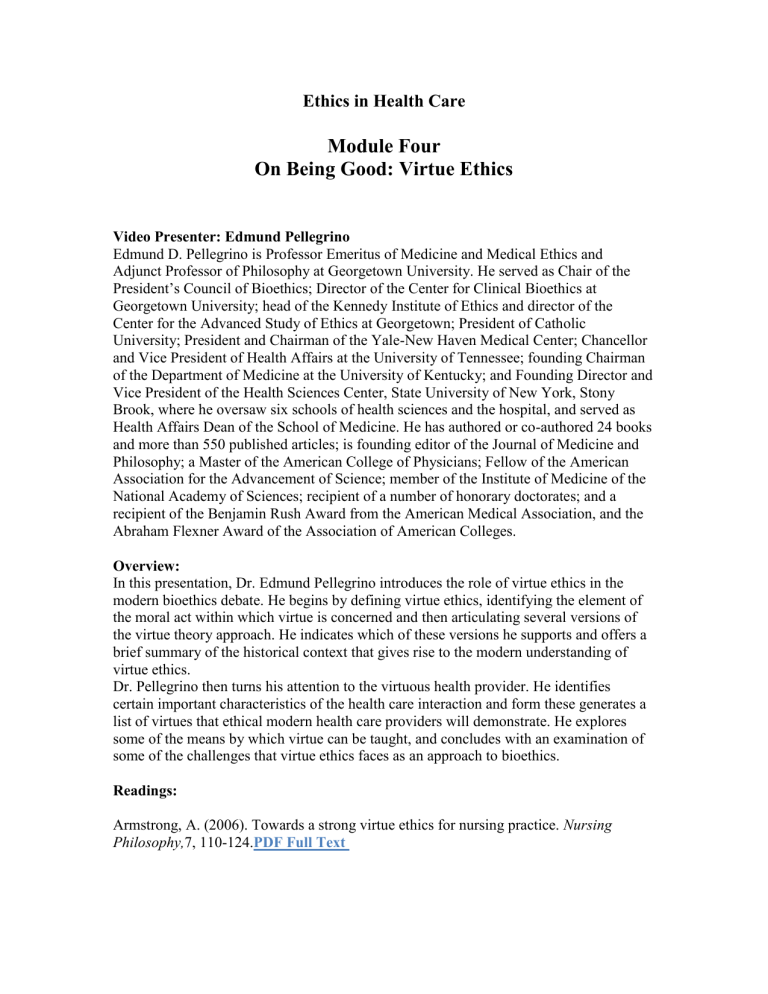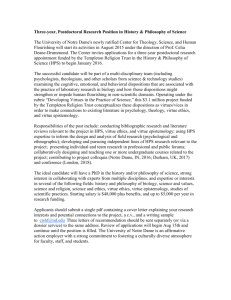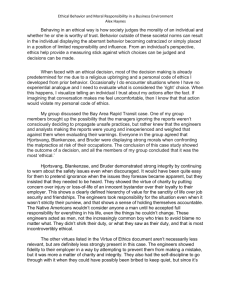Ethics in Health Care - Health Sciences North

Ethics in Health Care
Module Four
On Being Good: Virtue Ethics
Video Presenter: Edmund Pellegrino
Edmund D. Pellegrino is Professor Emeritus of Medicine and Medical Ethics and
Adjunct Professor of Philosophy at Georgetown University. He served as Chair of the
President’s Council of Bioethics; Director of the Center for Clinical Bioethics at
Georgetown University; head of the Kennedy Institute of Ethics and director of the
Center for the Advanced Study of Ethics at Georgetown; President of Catholic
University; President and Chairman of the Yale-New Haven Medical Center; Chancellor and Vice President of Health Affairs at the University of Tennessee; founding Chairman of the Department of Medicine at the University of Kentucky; and Founding Director and
Vice President of the Health Sciences Center, State University of New York, Stony
Brook, where he oversaw six schools of health sciences and the hospital, and served as
Health Affairs Dean of the School of Medicine. He has authored or co-authored 24 books and more than 550 published articles; is founding editor of the Journal of Medicine and
Philosophy; a Master of the American College of Physicians; Fellow of the American
Association for the Advancement of Science; member of the Institute of Medicine of the
National Academy of Sciences; recipient of a number of honorary doctorates; and a recipient of the Benjamin Rush Award from the American Medical Association, and the
Abraham Flexner Award of the Association of American Colleges.
Overview:
In this presentation, Dr. Edmund Pellegrino introduces the role of virtue ethics in the modern bioethics debate. He begins by defining virtue ethics, identifying the element of the moral act within which virtue is concerned and then articulating several versions of the virtue theory approach. He indicates which of these versions he supports and offers a brief summary of the historical context that gives rise to the modern understanding of virtue ethics.
Dr. Pellegrino then turns his attention to the virtuous health provider. He identifies certain important characteristics of the health care interaction and form these generates a list of virtues that ethical modern health care providers will demonstrate. He explores some of the means by which virtue can be taught, and concludes with an examination of some of the challenges that virtue ethics faces as an approach to bioethics.
Readings:
Armstrong, A. (2006). Towards a strong virtue ethics for nursing practice. Nursing
Philosophy, 7, 110-124.
PDF Full Text
Gardiner. (2003). A virtue ethics approach to moral dilemmas in medicine. Journal of
Medical Ethics, 29,297- 302. http://jme.bmj.com/content/29/5/297.full.pdf
Jansen, L. (2000). The Virtues in their place: virtue ethics in medicine. Theoretical
Medicine and Bioethics , 21(3), 261-276
Pellegrino, E. (1995). Toward a virtue based normative ethics for the health professions.
Kennedy Institute of Ethics Journal, 5(3), 253-277.







